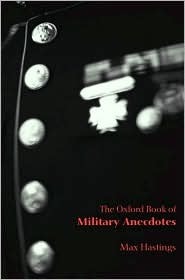
If anecdotes are marginal notes on the pages of history, these will delight any reader who has ever been moved or entertained by the condition of the soldier. Few fields of human endeavor have inspired so many memorable anecdotes as warfare, from the Bible and Livy through Gibbon and Froissart, to the imperial wars of the nineteenth century and the world conflicts of the twentieth. This collection is principally concerned with American and British conflicts, with, as the author says, "occasional forays among the ranks of foreign armies"—notably the Greeks, the Romans, and Napoleon's veterans. Hastings has sought stories that illustrate the military condition through the ages, both on the battlefield and in comic, eccentric, heroic, tragic. Here are Caesar at the Rubicon and the revolt of the Praetorian Guard; Alexander's horse and Prince Rupert's dog; the legendary Mother Ross enlisting in search of her lost husband in 1693; Evelyn Waugh as the least plausible of commandos; General Douglas MacArthur's good luck charm "Charlie," a lump of lava rock carved into a Hawaiian warrior; and much more. Some of the stories will be familiar to students of military history while others are less well known, but all provide fascinating sidelights to history.
Author

Sir Max Hugh Macdonald Hastings, FRSL, FRHistS is a British journalist, editor, historian and author. His parents were Macdonald Hastings, a journalist and war correspondent, and Anne Scott-James, sometime editor of Harper's Bazaar. Hastings was educated at Charterhouse School and University College, Oxford, which he left after a year.After leaving Oxford University, Max Hastings became a foreign correspondent, and reported from more than sixty countries and eleven wars for BBC TV and the London Evening Standard. Among his bestselling books Bomber Command won the Somerset Maugham Prize, and both Overlord and The Battle for the Falklands won the Yorkshire Post Book of the Year Prize. After ten years as editor and then editor-in-chief of The Daily Telegraph, he became editor of the Evening Standard in 1996. He has won many awards for his journalism, including Journalist of The Year and What the Papers Say Reporter of the Year for his work in the South Atlantic in 1982, and Editor of the Year in 1988. He stood down as editor of the Evening Standard in 2001 and was knighted in 2002. His monumental work of military history, Armageddon: The Battle for Germany 1944-1945 was published in 2005. He is also a Fellow of the Royal Society of Literature. Sir Max Hastings honoured with the $100,000 2012 Pritzker Military Library Literature Award for Lifetime Achievement in Military Writing.